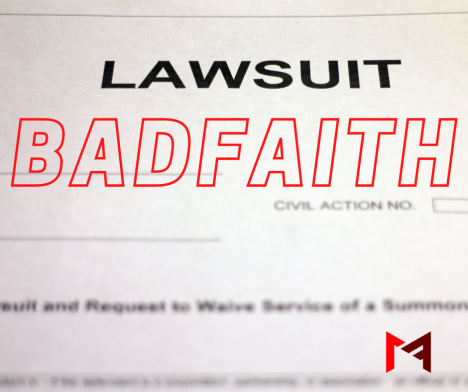What Is An Insurance Bad Faith Lawsuit?

If you have insurance, you probably already know the basics of how a policy is supposed to work. You pay a premium to your insurance company for a policy that provides coverage of losses related to your car or vehicle, home and accident-related medical treatments. When you experience loss or damage, you typically file a claim to your insurance company and it sends you a check for the replacement costs. Sometimes, however, this process is not that simple.
In some cases, the insurance company offers you a lower amount than what it will take to replace or repair the damages. It may be that the policy does not cover your claim, or it could be a case of insurance bad faith. Insurance bad faith is when an insurance company fails to cover your claim as it should according to the terms of your policy. In order to guard their profits, insurers sometimes commit deceptive practices, deliberately misinterpret their own policy language or records to avoid paying a claim, use unreasonable delays to avoid resolution of a claim, make arbitrary demands regarding proof of loss, use abusive tactics, ask an insured to contribute to a settlement when the insured should not have to make that contribution, or fail to conduct a thorough investigation.
What to Do If Your Claim is Denied
Never feel like you have to accept denial of your claim right away. Adjusters know that you need to move forward with car repairs or replacement, medical treatments, home repairs, or whatever else you need. Besides, they have a huge number of claims being filed every day and they need to keep cases flowing in order to stay on top of their business. In many cases, claims are in need of additional review after they are approved or denied.
If the insurance company denies all or a portion of your claim, you can ask for additional review. The adjuster is the first line of communication, but there’s always a supervisor who might have more ability to make decisions about a claim. If appealing to a supervisor doesn’t help you reach a resolution, you can contact the department in your state that regulates insurance and file a complaint.
When to Contact a Bad Faith Insurance Lawyer
If you’ve appealed to the highest level possible within the insurance company and made a complaint to the state insurance department’s consumer bureau, the next step is to contact a lawyer who specializes in bad faith insurance lawsuits.
Your lawyer may begin by trying to advocate directly to the insurance company to negotiate for a reasonable settlement. Sometimes, a phone call or demand letter from a lawyer will trigger a higher level of scrutiny by the insurance company, and it could be enough to settle your claim without the need for a trial.
Elements of a Bad Faith Insurance Claim
A bad faith insurance lawsuit falls under personal injury law. Each state handles insurance bad faith a little differently, and your lawyer will know what the standard is in the jurisdiction where your lawsuit is filed.
Some states view bad faith insurance as a breach of contract dispute, while others consider it part of tort law. In general, under a tort law definition, an insurer owes a policyholder a duty of good faith and fear dealing because of the special relationship between the parties.
In order to prove bad faith under common law, the plaintiff needs to prove that:
- The insurance company withheld benefits owed under the policy. In other words, the original claim was valid under the terms of the policy and was denied anyway.
- The insurance company was unreasonable in its withholding of benefits. This is where the evidence becomes important. Negligence isn’t enough to prove bad faith. The insurance company must have withheld benefits intentionally and unreasonably.
Proof of Bad Faith
Once a lawsuit is filed, your attorney will begin the process of discovery. Discovery is when both parties have the opportunity to review the opposition’s evidence. It usually involves examination of documents, requests for admission or denial of facts, and questioning that needs to be answered under oath. Your lawyer could seek to prove that the insurance company did at least one of the following:
- Misrepresented relevant facts or provisions of the insurance policy.
- Failed to reasonably explain why your claim was denied.
- Failed to accept your claim and process it within a reasonable amount of time.
- Failed to approve or deny your claim within a reasonable amount of time.
- Failed to reasonably investigate your claim.
Most people purchase insurance to guard against economic losses from personal injuries or property damages, or the possibility of a lawsuit that will result in losses. In exchange for paying premiums, a policyholder is owed various duties by the insurer. This includes a duty to provide coverage, a duty to uphold the terms of the policy, and pay any valid claims that are covered by the policy. All insurance companies also owe an implied duty of good faith or fair dealing.
An insurer that is found to have acted in bad faith can be liable for damages in excess of the policy limits, including liability for judgments in excess of the policy’s limits, statutory penalties, interest, emotional distress, consequential economic losses, attorneys’ fees, and punitive damages.
If you believe you are a victim of bad faith, contact us today.